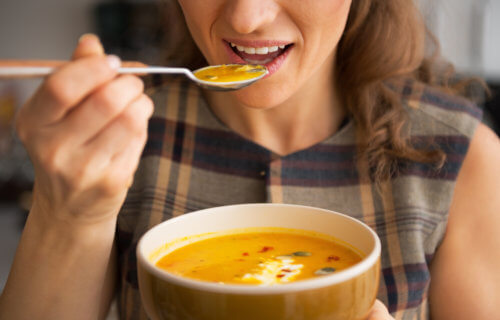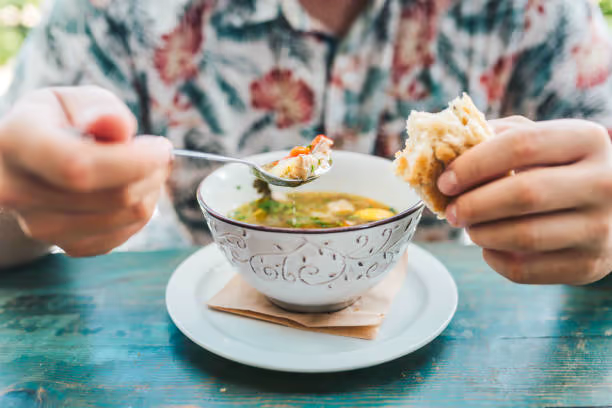If you've ever left soup or broth in the pot, intentionally or accidentally, overnight, you've probably wondered whether it's still safe to eat it after reheating it. Harold McGee asked himself the same question, especially when he learned that food writer Michael Ruhlman was using stock from a pot left out all week. He spoke with a food safety expert to find out if boiled broth is still safe to eat if left overnight or even for several days.
So, Do you think Left Chicken Soup Out Overnight? You should be ashamed. But now you're wondering: is it still good to eat?
Now I'll tell you how to tell if a soup or stew is bad for you and what's happening. . if you eat spoiled soup or stew. I also answer some questions about how to cook soup in a slow cooker or instant pot and how to properly refrigerate soup.
How long can a soup or stew sit before it goes bad?

source: google.com
Here's the official answer, based on USDA recommendations: Stew or soup should not be consumed if left out for more than two hours. And if it's very hot outside (over 90°F), an hour is the rule.
Temperatures between 40 and 140°F are called the "heat zone". designated danger "zone". In this temperature range, bacteria multiply rapidly and can cause illness.(Source)
Read Also: The 15 Best Bean Recipes You Should Try
This also applies to soup or stew you left in the Dutch oven or in the Instant Pot turned off overnight. Once the soup cools below 140°F, it enters the "danger zone" and the bacteria can multiply for the rest of the night.
This applies to all soups and stews, regardless of their meat or milk content. Applies to chicken stew, beef stew, pork stew, vegetable soup, tomato soup, bean soup, pea soup, left chicken soup out overnight, lentil soup, mushrooms and more.
Can I cook cooked food overnight in the slow cooker?
If your slow cooker, slow cooker, slow cooker, or Instant Pot heats food above 140°F overnight, you should be fine. But don't leave soup overnight in an appliance that's turned off.
Cooked and perishable foods should not be stored between 40°F and 140°F for more than two hours. Leaving food overnight without heating or cooling it, even in a slow cooker or Instant Pot, gives bacteria plenty of time to multiply.
Staphylococcus aureus bacteria can multiply rapidly. , especially between 50 degrees and 120 degrees Fahrenheit. That's why you shouldn't leave a stew or soup overnight in a pot at room temperature (even with the lid tightly closed).
You can do it, Is is the rest still heating up? Soup? Going out in the evening?
Heating soup left overnight does not necessarily make it safe. Many bacteria, including staphylococci, can produce toxins that cannot be destroyed by heating. Therefore, even boiling the soup again is not safe.
If the soup or stew has been refrigerated overnight, it will obviously be reheated the next day. In order. However, it is advisable not to leave it out of the refrigerator for more than two hours. The idea is to always keep perishable foods hot or cold and not in the center, where bacteria can multiply.
Read Also: Virgin Voyages Menus: Scarlet Lady Where To Eat Breakfast 2023
How do you know if your soup is bad?

source: google.com
If it is If you forgot the stew, you shouldn't try to use your senses to judge whether it's bad. Make your decision based on the number of hours the dish has spent in the 40 to 140°F "danger zone" since cooking.
If If left in hazardous area for more than 2 hours, it must be disposed of in accordance with USDA recommendations. If it's been in the fridge for more than 5 days, it should probably be thrown away.
What if the soup doesn't contain meat, right?
Many people think that the only risk is to eliminate foods like meat and dairy. In fact, the same two-hour rule also applies to plant-based soups and stews. And this actually applies to all foods that need to be refrigerated.
It doesn't matter if your soup contains meat, milk or cream. has a cold. You should treat it. Yes. If left at room temperature overnight, the USDA would recommend throwing it away. Also for vegetable stews, tomato soups, etc.
What happens if you eat spoiled soup?
Limited consumption of soup or stew can cause staph food poisoning.
Pathogenic bacteria such as Salmonella, E. coli and Clostridium botulinum can cause illness, hospitalization or even death death.
Can you let the soup cool overnight?
Can't you? You should not let the soup cool for more than two hours. It's a common mistake to think that you need to let soup cool before putting it in the refrigerator. It is not necessary to refrigerate the soup and stew before refrigerating them. You can put the hot soup directly in the refrigerator.
FAQs
Can chicken soup be left overnight?
For safety and quality reasons, it is necessary to cook the soup at its interior. Consume in the refrigerator for 3-4 minutes, store for several days or freeze. And avoid leaving the soup at room temperature for more than TWO hours. Don't put a large pot of hot soup directly in the refrigerator.
Can I leave the chicken overnight?
It is not safe to eat raw or cooked chicken that has been held at room temperature for more than two hours. Instead, it's better to throw it away, otherwise you risk food poisoning.'
How long does chicken soup last?
Shallow containers or small amounts of hot food can be placed directly in the refrigerator or cooled quickly in an ice bath or cold water before refrigerating. Cover foods to retain moisture and prevent them from absorbing odors from other foods.
Does chicken broth spoil if not refrigerated?
Unopened chicken broth keeps well in the cupboard or pantry. Any cool, dry place is a great place to store this kitchen essential. After opening the broth, place it in its new location in the refrigerator for proper storage.
How long should chicken broth cool before refrigerating it?
While many of us have been advised to let foods come to room temperature, our friends at the USDA tell us that doing so is unnecessary and probably unwise . Instead, they recommend refrigerating soups and broths as soon as they reach 60°C, which is when they reach the danger zone.
By Gaurav

